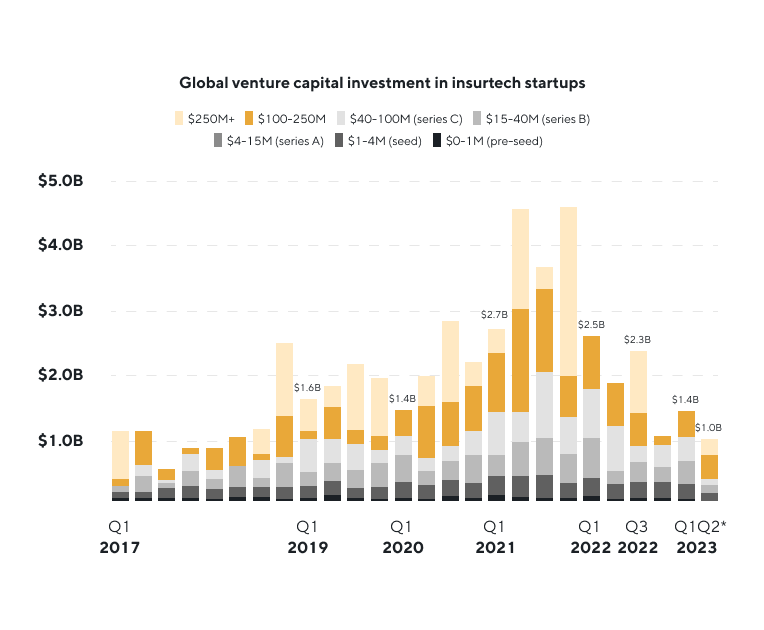We are witnessing rapid business environment changes as technological advancements have significantly accelerated in recent years. This acceleration has compelled many companies, including insurers, to reassess their priorities and embrace transformation. The initial implementation of technical solutions serves as a precursor to the imminent change awaiting all players in the insurance market.

Insurtech is still heavily underinvested compared with other industries of similar sizes, such as Mobility, Food, and Health.
Source: Dealroom.co Insurance market size based on GWP
According to the Deloitte report titled “Insurance Outlook 2023: The Global Insurance Industry at a Crossroads to Build Long-Term Success,” insurers must shift their focus from investing in infrastructure to realizing its value. The report states, “The goal for 2023 and beyond should fully capitalize on the benefits of technology infrastructure investments, enabling insurers to become more agile, innovative, and customer-centric. Insurers often take a phased approach to technological modernization, incrementally transforming their systems, functions, and applications. However, investment decisions are often driven by short-term budgetary and feasibility considerations rather than a long-term perspective aimed at enhancing competitiveness and improving the customer experience. A fundamental shift in perspective and priorities is necessary.”

Source: Dealroom.co. *Data up to 2nd June 2023.
Based on the compelling statistics, it is evident that the insurance industry is undergoing significant change and transformation. Leading the charge are insurtech companies and startups, which are already positioning themselves to leverage future challenges to their advantage. However, what are the upcoming trends for the industry?
Trend 1: Personalization of Customer Needs and Preferences
Modern customers seek more than just financial protection. They desire personalized solutions that cater to their specific requirements in their daily lives. Whether purchasing a car, planning for retirement, or starting a business, customers expect insurers to go beyond their risk transfer obligations and offer comprehensive solutions that encompass risk prediction, prevention, and intervention. Moreover, customers demand that robust digital and information capabilities support these services.
Insurers must reconsider how they serve customers, provide advice, and leverage new partnerships and innovative approaches to remain competitive. This entails creating sustainable business models that drive growth and enhance customer experience.
Trend 2: Digitalization of the World and the Impact of Artificial Intelligence
Digital innovation and adoption fundamentally change the risk landscape, creating new opportunities for insurers who can keep pace with innovation. Technologies like self-driving cars, robotic factories, embedded sensors, crypto assets, and non-fungible tokens (NFTs) are rapidly growing in influence. According to the United Nations’ 2021 Technology and Innovation Report, the advanced technology market is projected to increase ninefold by 2025, with contributions from IoT, big data, solar panels, and robotics, resulting in a $3.2 trillion market.
Automation and artificial intelligence are revolutionizing interactions between insurers and consumers throughout the value chain, from product design to underwriting, pricing, and claims processing. Digitized customer interactions now include using “bionic advisors” that seamlessly blend human and digital experiences. The abundance of data sources and analytical capabilities creates opportunities for event-based and usage-based insurance, real-time pricing, and claims processing.
Insurers can utilize digital twins of customers to predict and intervene in health-related events, and similar scenarios can be applied across insurance product lines using data from smart home sensors, vehicle telematics, and other IoT devices. To thrive, insurers must fully embrace the digital future, leveraging digital technologies, data, and responsible AI to drive product offerings, pricing strategies, and customer engagement. Adaptability and innovation will be crucial in this fast-evolving digital landscape.
Trend 3: Convergence, Collaboration, and Competition
The digital and data-rich economy enables organizations to share information, collaborate across industries, and create new value propositions for customers. Digital platforms such as ecosystems and marketplaces play a central role in areas like mobility, financial well-being, health, and addressing the needs of small and medium-sized enterprises (SMEs).
Collaboration through partnerships, acquisitions, and co-creation of technology, products, and services is critical for insurers to gain a significant competitive advantage. Insurers must rethink their partnerships and collaborations, moving beyond traditional industry boundaries to join ecosystems where insurance is just one part of the broader customer value chain. This may involve greater cooperation with conventional competitors, emerging insurtech companies, large technology firms, and related industries such as manufacturing, retail, and healthcare.
The collaboration will be vital in addressing systemic risks and developing industry-level solutions through public-private partnerships.
However, collaboration doesn’t mean competition diminishes. New entrants constantly strive to disrupt the industry, evidenced by significant venture capital investments in insurtech. To fend off these disruptions, incumbent insurers leverage their scale and financial stability, partnering with tech companies to reinvent themselves. An ecosystem comprising incumbent insurance companies, insurtech firms, and large technology companies can provide a much-needed boost for the industry, combining their strengths for mutual benefit—ost for the industry.
A Decision to be Made Today
Irrespective of how insurers respond to these trends, they must anticipate the future and reconsider their position in the world. Having successfully navigated the initial years of the pandemic, it is now crucial to exhibit courage and develop an ambitious action plan. Technological innovation in user experience and product digitalization is the path to profitability. Therefore, the new competitive advantage for insurance companies lies in technological innovations and the digital adaptation of their business models to align with customer preferences. Should insurers invest in technology or acquire insurance startups? Should they develop innovations through collaborations with technology partners or establish internal research and development centers? These critical questions must be addressed today to ensure competitiveness in the future.
LaSoft is a trusted technology partner in the insurance industry, boasting extensive experience with digital products. Their services for insurers include:
Insurtech Software Development:
Partner with an insurtech software development company to receive high-quality software tailored to achieve your goals within the allotted timeframe. Services include:
- Custom insurance software with third-party integrations
- Adaptation of low-code software solutions for insurance industry startups
- Business process automation software
- Legacy system re-engineering
- Underwriting process automation
Insurance Mobile App Development:
Enhance customer service by developing beautiful and intuitive mobile apps that cater to the needs of insurance companies and startups. Solutions are available for all operating systems, including Android and iOS.
Insurance Product Development:
Fulfill user expectations by creating intuitive, user-friendly insurance products with only necessary features. Leverage design services to achieve this goal, which includes:
- Product discovery
- Prototyping
- UX/UI design
- Advanced data visualization
Data Analytics and Visualization:
Facilitate informed decision-making through advanced dashboards. LaSoft offers a comprehensive range of insurance data.


